How Does an Artist Manager Get Paid? Insights and Strategies for Success
Artist managers are the unsung heroes of the music industry, working tirelessly behind the scenes to ensure their artists achieve success.

Artist managers are the unsung heroes of the music industry, working tirelessly behind the scenes to ensure their artists achieve success. However, the question of how artists managers get paid can often be shrouded in mystery. This article will explore the various ways artist managers are compensated, offering insights and strategies for both managers and artists to build a fair and effective partnership. Understanding the nuances of these compensation models is crucial for fostering a healthy working relationship that benefits both parties. We'll dive into the common payment structures, challenges, and future trends shaping artist management compensation.
1. Defining the Role of an Artist Manager
Artist managers are responsible for a wide range of tasks, from scheduling and promotion to negotiating contracts and strategic planning. Their goal is to maximize the artist’s potential and earnings. Managers often serve as the bridge between the artist and various industry stakeholders, ensuring that the artist's interests are always represented and protected.
2. Standard Payment Models
Commission-Based Compensation: The most common method, where managers receive a percentage of the artist’s income (typically 15%-20%). This model aligns the manager’s interests with those of the artist, as both parties benefit from increased earnings.
Fixed Salary: Some managers, especially those in larger firms, receive a steady salary. This can provide stability for the manager but might lack the incentive alignment found in commission-based models.
Hourly Fees: Occasionally, managers might charge an hourly rate for specific consulting services. This can be advantageous for short-term projects or when the manager's involvement is limited.
Flat Fees: For one-off projects or specific services, managers may charge a predetermined flat fee. This model is often used for tasks like contract negotiations or marketing strategy development.
3. Key Revenue Streams for Artists
The income of artist managers is directly tied to the artist's earnings, which come from various sources:
Live Performances and Tours: Concerts and tours are major revenue sources. Managers are typically involved in negotiating performance fees, organizing logistics, and ensuring that tours are profitable.
Record Sales: Including physical albums and digital downloads. While physical sales have declined, digital downloads and limited edition releases can still generate significant income.
Streaming Revenue: Income from platforms like Spotify, Apple Music, and others. Streaming has become a major revenue source, though it often requires high play counts to generate substantial earnings.
Merchandising: Sales of branded merchandise. Merchandise can be a lucrative revenue stream, particularly for artists with a strong fan base.
Endorsements and Sponsorships: Deals with brands for promotions and advertisements. These partnerships can provide substantial income and increase the artist's visibility.
4. Importance of Clear Contractual Agreements
Contracts are crucial for outlining the payment structure and responsibilities of both parties. Key elements include:
Commission Rates: Clearly defined percentage agreements to avoid misunderstandings.
Contract Duration: Specifies how long the agreement will last, providing stability and clarity for both parties.
Termination Clauses: Conditions under which the contract can be ended, protecting both the artist and manager.
Exclusivity Clauses: Prevents the artist from engaging other managers, ensuring that the manager’s efforts are exclusive and dedicated.
5. Challenges and Solutions in Artist Management Compensation
Fluctuating Income: The unpredictability of the music industry can lead to variable earnings. Artists and managers must prepare for these fluctuations by managing finances prudently and diversifying income streams.
Disputes Over Payments: Clear and detailed contracts help prevent misunderstandings. Regular communication and contract reviews can also mitigate potential conflicts.
Adapting to New Revenue Models: As the industry evolves, so do the ways artists earn money. Managers need to stay informed about emerging trends and technologies to maximize their artists' earnings.
6. Case Studies: Learning from the Best
Analyzing successful and unsuccessful artist-manager relationships can provide valuable lessons:
Successful Partnerships: Examples of top artist-manager duos and their compensation models. For instance, the long-standing relationship between Beyoncé and her manager Mathew Knowles demonstrates the importance of trust and clear financial agreements.
Conflict Resolution: Learning from disputes that have been resolved or led to the end of professional relationships. The split between Lady Gaga and Troy Carter highlights the need for clear communication and aligned goals.
7. The Future of Artist Management Compensation
Emerging trends and technological advancements are shaping the future of artist management compensation:
Digital Tools: Platforms that help streamline management tasks and payment processes. Tools like Maestro and Backstage provide comprehensive solutions for managing tours, finances, and contracts.
New Revenue Opportunities: The increasing importance of social media and digital content monetization. Platforms like Patreon and YouTube offer new ways for artists to earn money, which in turn affects how managers are compensated.
Blockchain Technology: Could revolutionize how royalties and payments are tracked and distributed, providing more transparency and efficiency in the music industry.
8. Managing Multiple Artists
Portfolio Management: Some managers handle multiple artists simultaneously. This diversification can stabilize income but requires excellent time management and organizational skills. Successful portfolio management involves balancing the needs of different artists and ensuring that each receives adequate attention and resources.
Conflict of Interest: Managing multiple artists in similar genres or markets can lead to conflicts of interest. Clear agreements and ethical guidelines are essential to navigate these situations. Managers should establish boundaries and protocols to ensure fair and unbiased representation for all their clients.
9. Financial Planning and Advising
Budgeting: Managers often assist artists with budgeting and financial planning. This includes forecasting income, managing expenses, and planning for taxes. Effective financial planning ensures that both the artist and manager can weather financial uncertainties and invest in future opportunities.
Investment Strategies: Advising artists on investment opportunities and retirement planning. Diversifying income streams and investing wisely can ensure long-term financial stability for both the artist and manager. Managers can play a crucial role in identifying sound investment opportunities and advising on financial growth strategies.
10. Navigating the Global Market
International Management: Working with artists who have a global presence introduces additional complexities such as international tax laws, currency exchange rates, and global marketing strategies. Managers must be knowledgeable about the legal and financial aspects of different markets to maximize global opportunities.
Cultural Sensitivity: Understanding and respecting cultural differences is crucial in managing international artists. This can impact marketing strategies, contract negotiations, and public relations efforts. Managers need to be culturally aware and adaptable to effectively promote their artists in diverse markets.
11. Building and Sustaining Professional Relationships
Trust and Communication: Building trust and maintaining open communication are essential for a successful artist-manager relationship. Regular check-ins, transparent financial reporting, and mutual respect foster a positive working environment.
Professional Development: Managers should continually seek opportunities for professional development. Attending industry conferences, networking with peers, and staying updated on industry trends ensure that managers can provide the best possible guidance to their artists.
Conclusion:
The relationship between an artist and their manager is foundational to the artist’s success. Understanding the various ways artist's managers are compensated helps ensure a fair and productive partnership. Clear contracts, open communication, and adaptability to industry changes are key to navigating the complexities of artist management compensation. Managers must continually educate themselves about industry trends and legal requirements to protect their interests and those of their artists. As the music industry continues to evolve, staying informed and proactive will help both managers and artists thrive.
About the Creator
Enjoyed the story? Support the Creator.
Subscribe for free to receive all their stories in your feed. You could also pledge your support or give them a one-off tip, letting them know you appreciate their work.






Comments
There are no comments for this story
Be the first to respond and start the conversation.